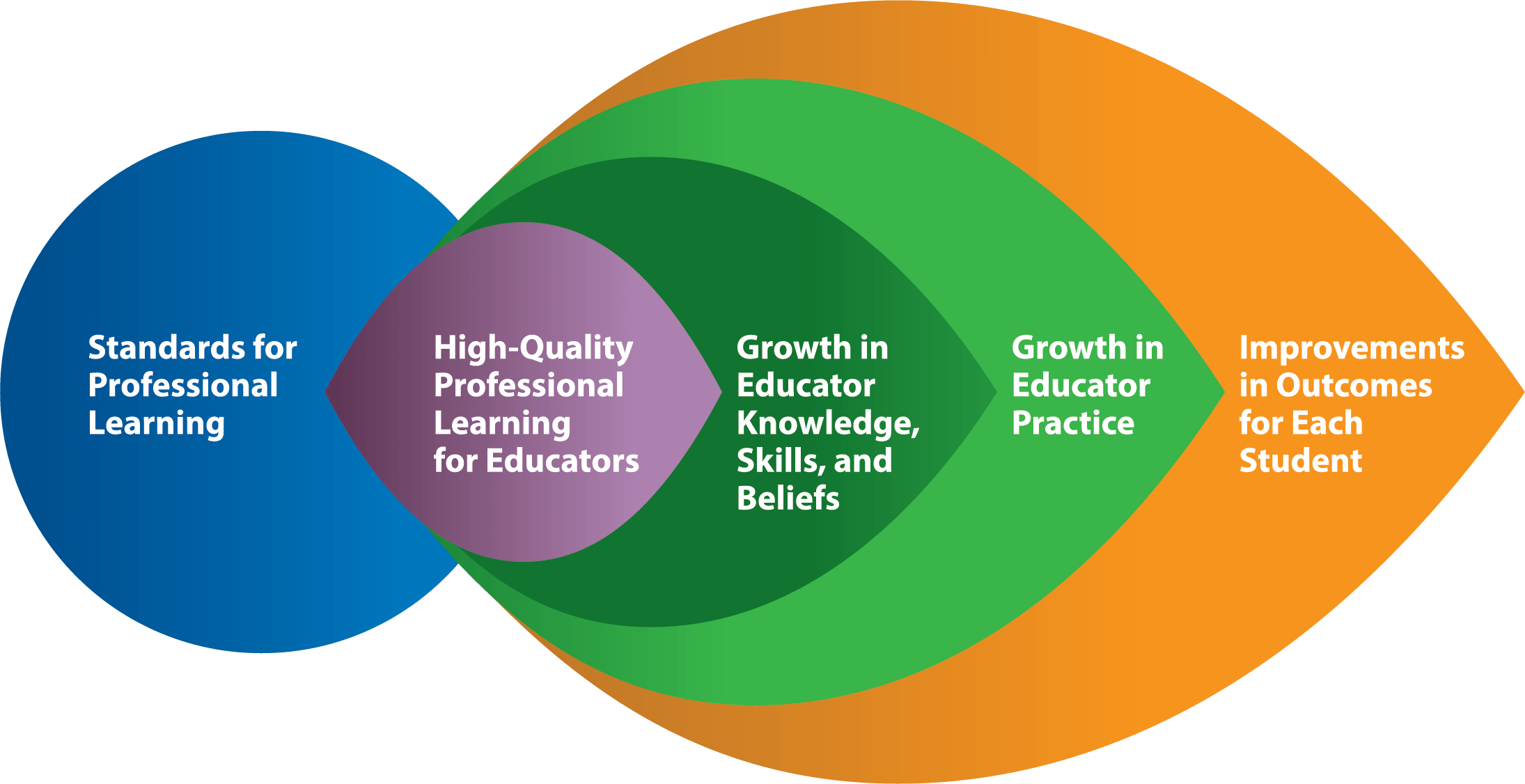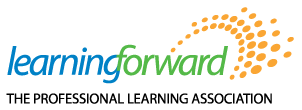How standards lead to improvement for all learners

Learning Forward offers Standards for Professional Learning to describe the conditions, content, and processes for professional learning that leads to high-quality leading, teaching, and learning for students and educators.
A pathway to excellence
Standards for Professional Learning lead to high-quality professional learning, which leads to positive changes in educator knowledge, skills, and dispositions, which lead to improvements in educator practice, which in turn lead to accelerated student results.
As the graphic above illustrates, Standards for Professional Learning generate a learning system in which high-quality professional learning results in the improvements educators seek for themselves and their students. Changes and evidence at each step of the way contribute to continued improvement throughout the system, with student and educator data providing evidence about how professional learning evolves to contribute to excellence.
Educators at all levels require high-quality professional learning specific to their roles and responsibilities within schools and school systems. The content of professional learning outlines not only what teachers are responsible for in their daily work in classrooms with students but also what educators in every role need to be effective leaders for their peers, schools, departments, teams, and systems.
Professional learning for leaders, whether at the principal, coach, superintendent, or director of central office level, builds knowledge, skills, and practices for leadership that advances high-quality teaching and learning.
Standards for Professional Learning work in concert
To create high-quality professional learning that results in improved educator practices and improved student results, educators apply all standards in concert. When educators focus on one or several standards to the exclusion of others, they will be less likely to achieve the ambitious results they seek.
Underscoring the need for both a professional learning system and a systemic approach to professional learning, Standards for Professional Learning work within a framework of three categories: Rigorous Content for Each Learner, Transformational Processes, and Conditions for Success.
Standards within the Rigorous Content for Each Learner frame describe the essential content of adult learning that leads to improved student outcomes.
Standards within the Transformational Processes frame describe process elements of professional learning, explaining how educators learn in ways that sustain significant changes in their knowledge, skills, practices, and mindsets.
Standards within the Conditions for Success frame describe aspects of the professional learning context, structures, and cultures that undergird high-quality professional learning.
The three categories echo earlier versions of Standards for Professional Learning that organized standards by context, process, content.
Standards for Professional Learning within their framework are represented in a circle (see graphic above) for several reasons:
Educators may approach high-quality professional learning through any one of several pathways, depending on their role, a critical team or individual learning need, or strategic improvement priority.
The way the 11 standards meet at the center represents that they converge, connect, and integrate when used with integrity.
The circle shape also suggests a cycle. Cycles of continuous improvement are embedded in many of the standards and essential to their effective use and implementation.
The standards within the Rigorous Content for Each Learner category sit at the top of the circle of 11 standards because they represent the work of educators that is closest to students and the aspirational outcomes all educators seek in schools. The standards within the Transformational Processes and Conditions for Success categories make rigorous content for each learner, whether student or educator, possible.
Research undergirding standards
Learning Forward considered many sources in building the research foundation for the standards revision, including our own research, other standards, theoretical frameworks, case studies, qualitative research, and large-scale data studies. Selected research is listed for each standard; not all research consulted is listed.
Learning Forward contracted with the American Institutes of Research (AIR) to conduct a comprehensive literature review of studies of professional learning interventions and their teacher and student outcomes.
Building on that work, AIR then conducted a meta-analysis, a systematic look at tightly scoped studies that tie key concepts in the standards to observable outcomes in teacher instruction and measurable outcomes in student learning. AIR found consistent evidence that program alignment with Learning Forward’s Standards for Professional Learning is associated with improved teacher instruction and student achievement outcomes.
Investments in professional learning can yield meaningful improvements in student achievement, and the benefits for students come through improvements in instruction.
Realizing the promise of Standards for Professional Learning
Understanding current Standards for Professional Learning is the first step in establishing high-quality professional learning systems to achieve excellence for all learners. Standards for Professional Learning support all educators to respond to the needs they face in schools and systems each day through sustained and high-integrity implementation.
Educators who work in environments driven by comprehensive professional learning systems have both the privilege and responsibility to achieve excellence for all students. With learning at the heart of schools, each student experiences the best possible teaching and support for their continued success.
